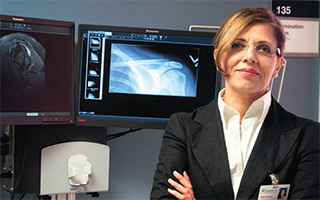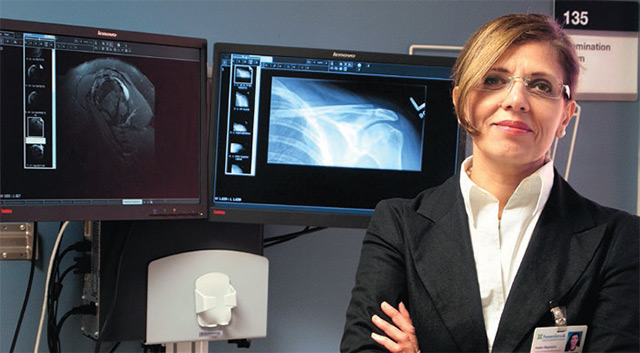Shouldering the Burden
Research supports an extended role for physiotherapists in the treatment of damaged deltoids
In a health care environment fraught with long wait times, the results of a study from the Holland Bone and Joint Research Program at Sunnybrook Research Institute (SRI) are welcome news.
For patients with shoulder problems, the wait time for surgical consultation in Ontario is as long as two years. Through visiting with an advanced practice physiotherapist (APP) first, however, these wait times are reduced significantly. The responsibilities of an APP include triaging referrals, providing assessment and ordering investigations (including magnetic resonance imaging and computed tomography scans, ultrasounds and X-rays).
About 50% of shoulder-related referrals do not require surgical intervention, and APPs are able to provide management for these patients within four to six weeks. For potential surgical candidates, investigations ordered prior to seeing the surgeon can speed operative care decisions. In addition, postsurgical patients without complications can be managed by APPs.
“Since the launch of the APP shoulder program in 2009, our senior shoulder specialist, Dr. Richard Holtby, has been able to focus more on surgical candidates,” says Dr. Helen Razmjou, an APP at Sunnybrook and associate scientist at SRI, who led the study.
Through the study, “Evaluation of an advanced-practice physical therapist in a specialty shoulder clinic: diagnostic agreement and effect on wait times,” Razmjou and colleagues found that 53% of the clinic’s shoulder patients could be treated by physiotherapists independently.
“We wanted to scientifically prove that our program was effective in reducing wait times while maintaining optimal care and patient satisfaction” says Razmjou, who says she wasn’t surprised by findings. “Science usually confirms what a good clinician already knows.”
Because the program is relatively new in Canada, Razmjou says that some patients can be initially reticent to see a physiotherapist instead of a surgeon. Following the examination and discussion of management of their care, however, these patients typically express satisfaction in how their care was facilitated.
“We still see occasional patients who say, ‘I don’t need to see a physiotherapist. I’m here because I need surgery,’” says Razmjou, who sees about 250 new patients and 300 follow-up patients every year. She notes that the conceptual model of APPs as independent examiners is becoming more accepted by family physicians and patients suffering from complex shoulder conditions.
Razmjou and her team are now studying the efficacy of the clinical decision-making process in regards to APPs ordering costly investigations. They are also developing risk factor and management assessment tools, which will help in estimating disease probability. With an aging population and a shortage of surgeons, Razmjou says that these studies could have greater implications, as they will enhance the ability of extended-role care providers across Canada to manage shoulder conditions using validated strategies.
“We need to maximize the use of our existing human resources. Using APPs will improve access and quality of health care at a reduced cost to the system,” she says.
— Jessica Wynne Lockhart
Funding for both studies has been provided by practice-based research funds through Sunnybrook Health Sciences Centre.





